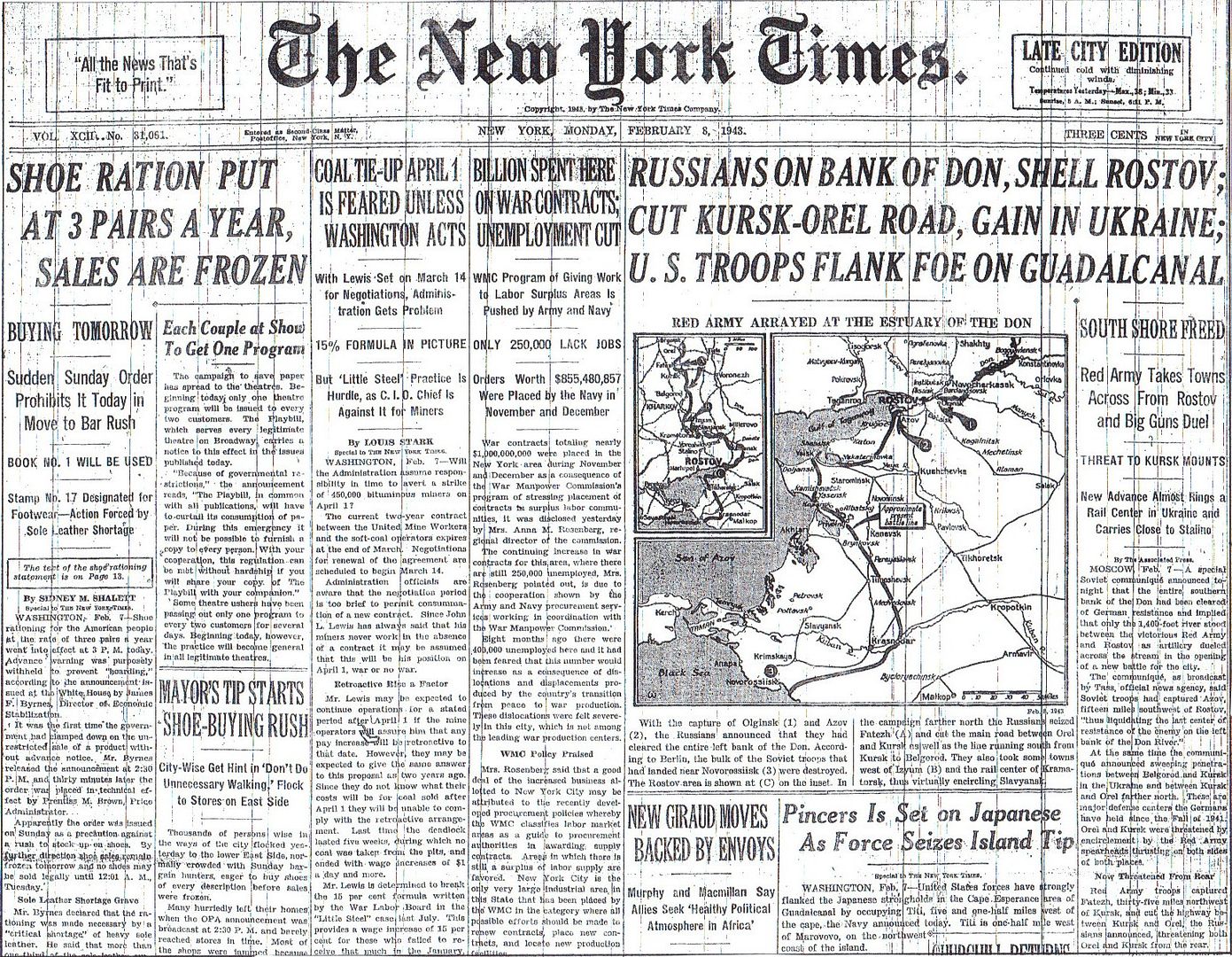
Posted on 02/08/2013 5:14:03 AM PST by Homer_J_Simpson

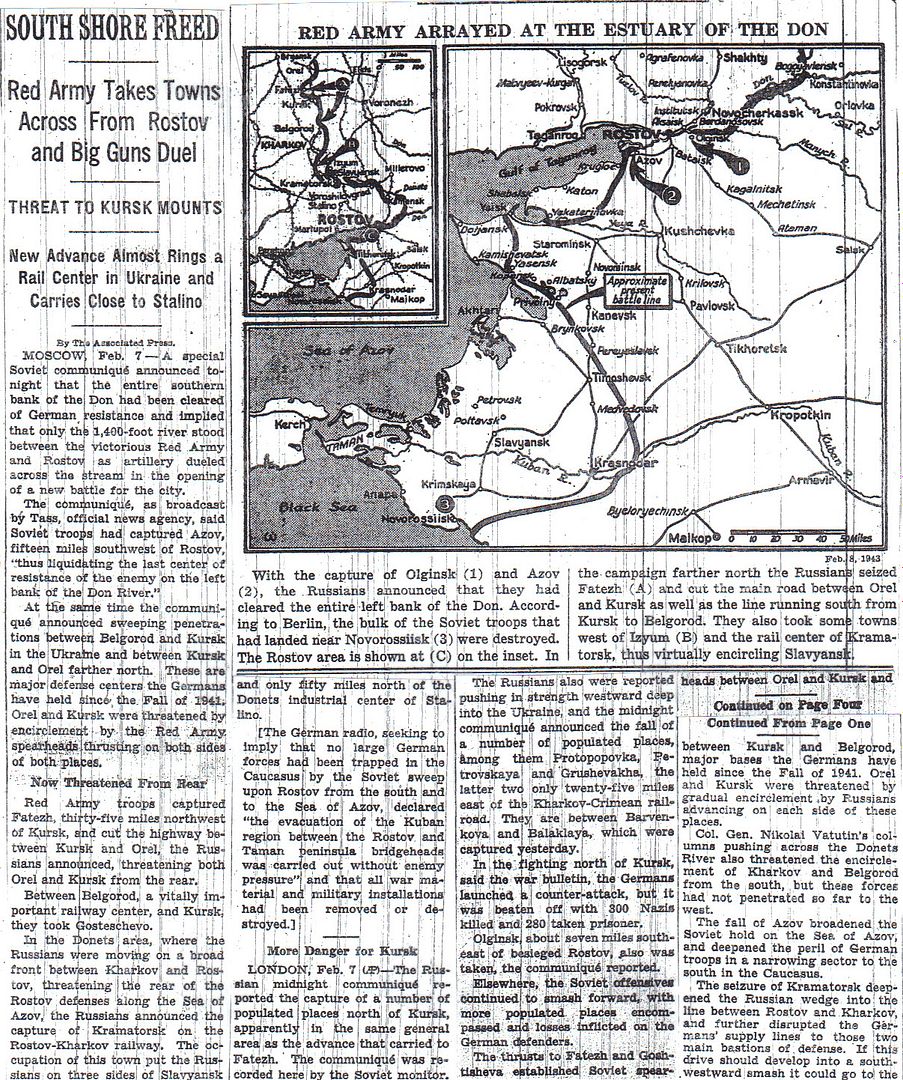
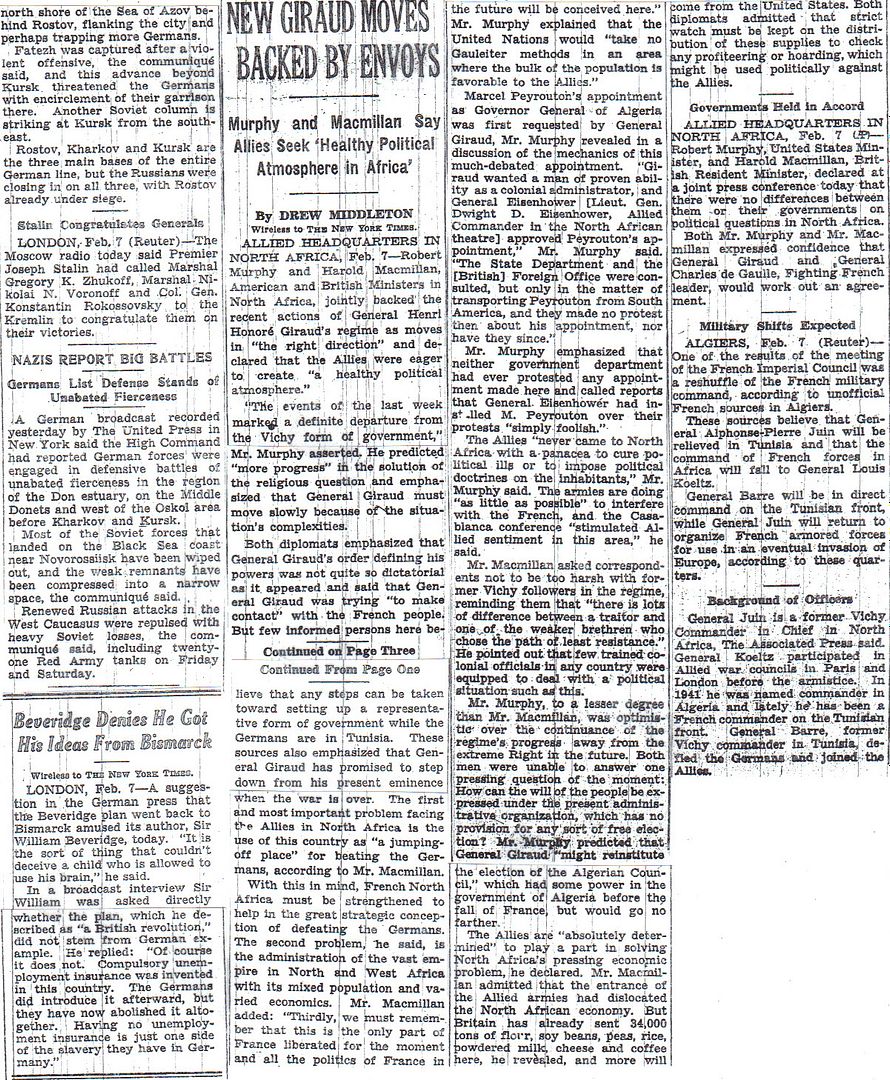
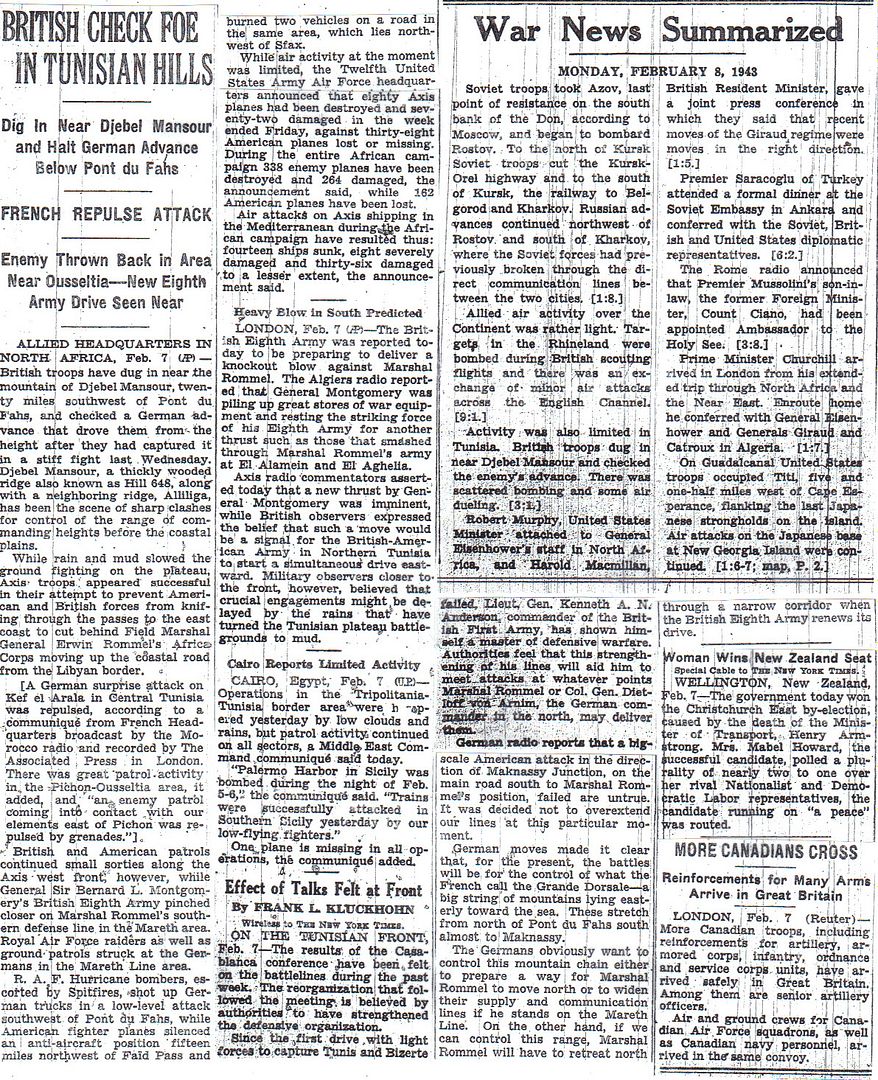
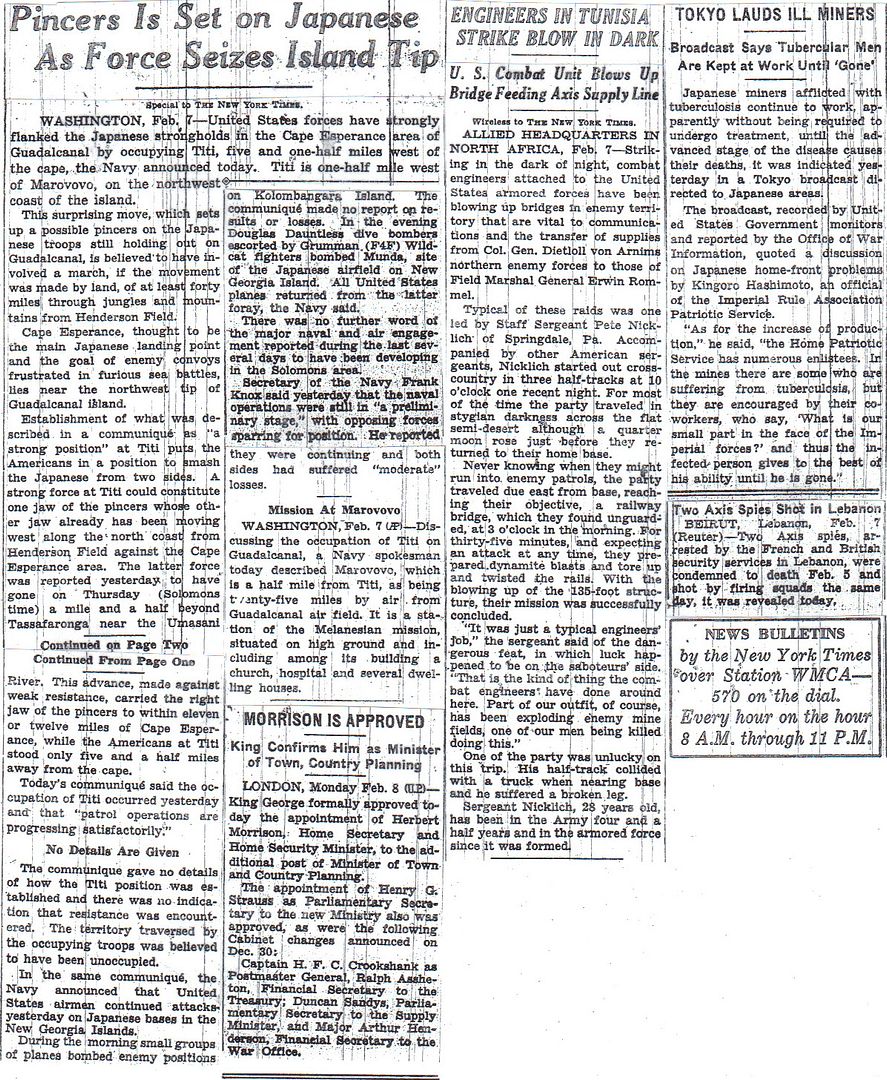
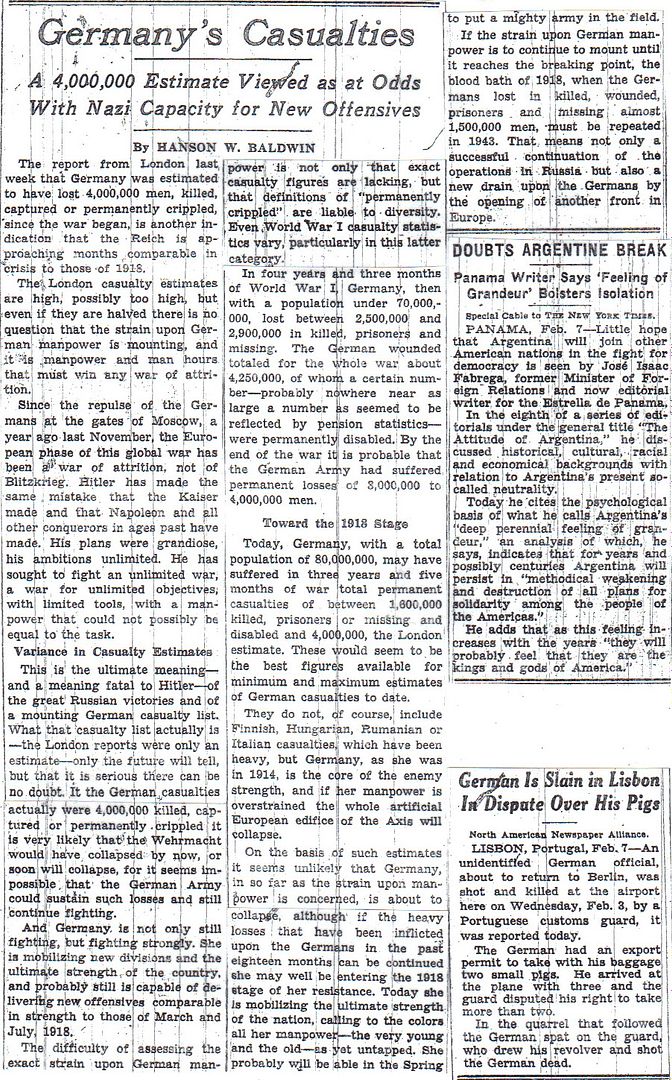
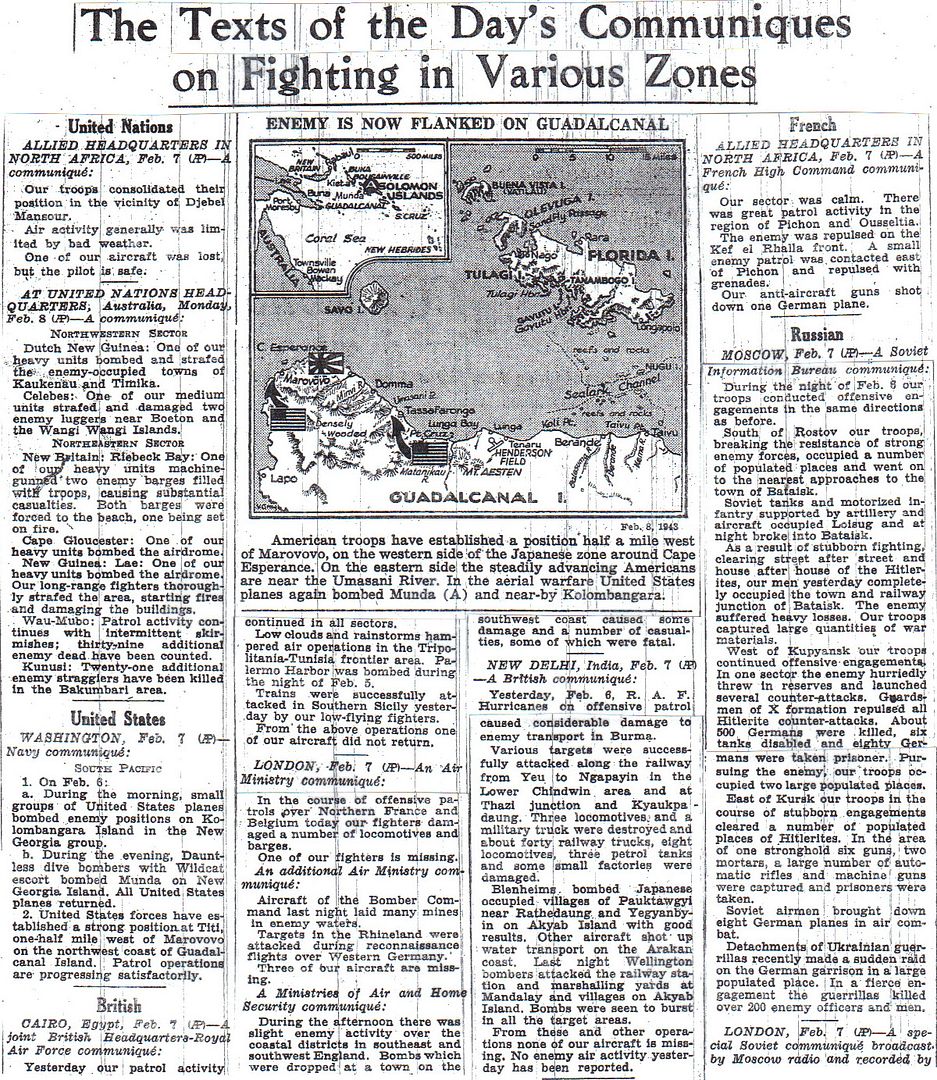
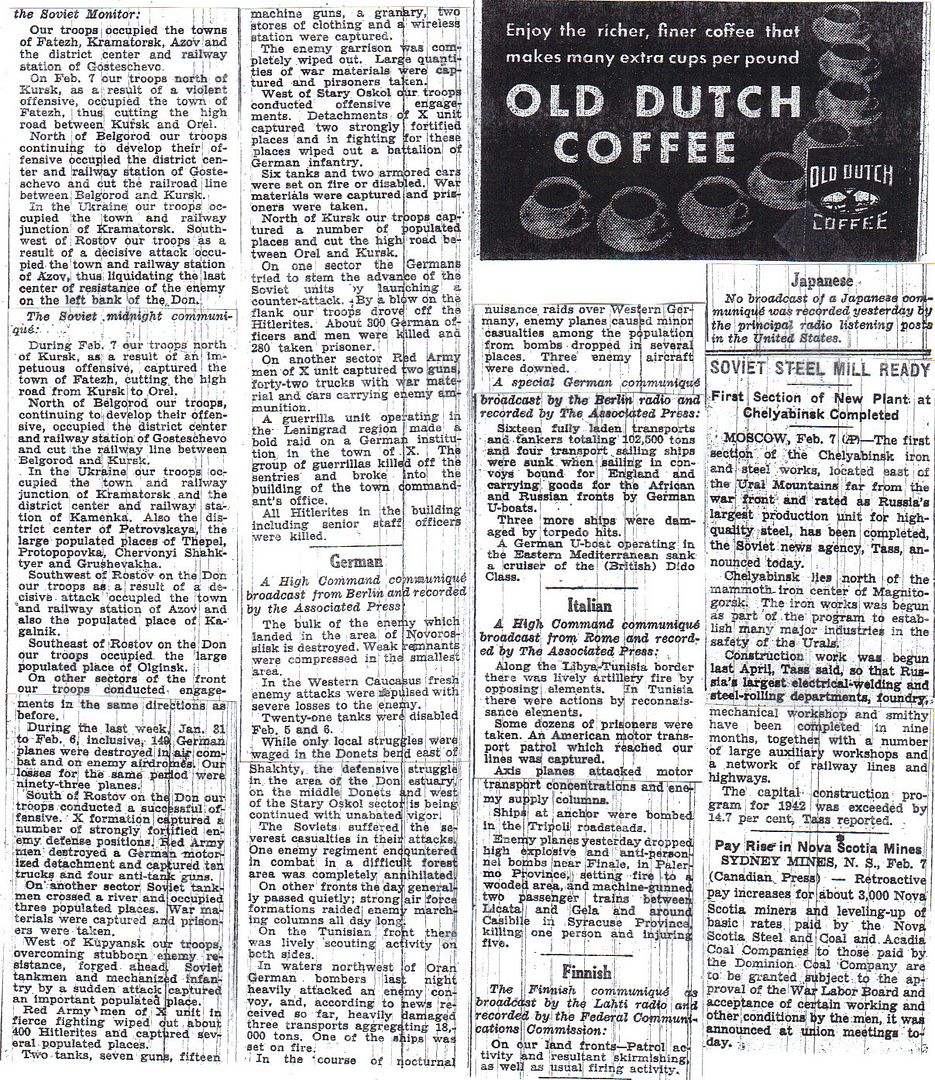
http://www.onwar.com/chrono/1943/feb1943/f08feb43.htm
First Chindit Raiding Expedition in Burma
Monday, February 8, 1943 www.onwar.com
General Wingate, commander of the Chindit forces [photo at link]
In Burma... The first Chindit raiding expedition sets out from Imphal for Tamu. The force is formally the 77th Indian Brigade under the command of General Wingate.
On the Eastern Front... Soviet forces capture Kursk.
In the Solomon Islands... The last 2000 Japanese troops are evacuated by 18 destroyers.
http://homepage.ntlworld.com/andrew.etherington/frame.htm
February 8th, 1943
UNITED KINGDOM: London: Churchill returned to London today after a four-week, 10,000-mile journey aboard a Liberator bomber with a US pilot, who took him to Casablanca, Cairo, Turkey, Cyprus, Algiers and the front line of the victorious Eighth Army in Tripoli. He completed the journey by rail, arriving at Paddington at 1.01pm, four minutes ahead of schedule. Within hours he was meeting ministers and service chiefs, reviewing the decision of the Casablanca meeting with President Roosevelt. The evening he plans to watch the new Ingrid Bergman and Humphrey Bogart film, Casablanca.
Minesweeper HMS Welfare laid down.
Submarine HMS Satyr commissioned.
Minesweeping trawler HMS Sir Kay commissioned.
(Dave Shirlaw)
GERMANY: Berlin: Himmler orders special measures to be taken at concentration camps to prevent mass breakouts during air raids.
U-1051, U-1052, U-1053, U-1196 laid down. (Dave Shirlaw)
U.S.S.R.: Kursk falls to the Soviets with a sudden outflanking movement which took the Germans by surprise. General Golikov’s troops also took Korocha, some 70 miles to the south, and the Russians now threaten the whole German line from Orel to Kharkov.
Kursk, captured by the Germans in November 1941, became the key to their communications network, the vital link in the shifting of supplies and reinforcements between the southern and central fronts.
It is the first of the three main bases - Kursk, Orel and Kharkov - which the Germans established as their winter line in 1941 to be recaptured.
The Germans used these bases as the starting points for their offensive last summer which led to Stalingrad. Now, it seems that the Russians will use Kursk to launch the northern arm of a pincer attack on Kharkov in order to trap SS General Hausser’s Panzer Korps. German correspondents reporting the battles at the approaches to Kursk comment with some awe on the numbers of tanks and guns deployed by the Russians.
One writes: “The Russian artillery barrage is like the roll of a giant’s drum. It is impossible to hear single explosions. It is an indescribable hurricane of sound. A human feels like an insignificant insect before this gigantic concentration of artillery force.”
MEDITERRANEAN SEA: HMCS Regina, a Flower-class corvette, LCdr. Harry “The Horse” Freeland, DSO, RCNR, CO, sank the Italian Platino-class submarine Avorio, Lt. Leone Fiorentini, CO, off Philipeville, in the Mediterranean Sea. Nineteen men were lost from her 46 crewmembers, including the Commanding Officer. Regina and the Bangor-class minesweeper HMS Rhyl were assigned to escort the bulk merchantman Brinkburn from Algiers to Bone, Algeria. She was loaded with 1,500 tons of aviation fuel in ‘tin cans’. At 2310, Regina, while in station at 4,000 yards on the port bow of the ‘convoy’, detected a radar contact at a range of 6,200 yards. She altered towards the contact and increased speed to 12 knots. Avorio, which was on the surface recharging her batteries, was unaware of Regina until she came quite close. The submarine was able to dive and reached 200 feet when Regina launched a 10-charge urgent attack that caused extensive damage to Avorio. When the boat resurfaced it was found that her helm was jammed, the pressure hull was ruptured, and the torpedo tubes distorted. As the submarine attempted to escape on the surface, Regina engaged with her 4-inch and 20-mm guns, to which Avorio replied with a 12.5-mm machine gun. Many hits were soon scored on the submarine and three of her officers and sixteen ratings were killed before fire was ceased. Seven other Italians were wounded, two of them seriously. An attempt was made to board and capture the submarine but it settled quickly, forcing the boarding party to abandon the boat by jumping into the sea. The submarine sank at 0515. Avorio was a medium-range submarine built by the O.T.O. shipyard. Her technical details were: Length - 60.20 m; Beam - 6.45 m; Draft - 4.75 m; Displacement - 710 tonnes surfaced and 870 tonnes submerged; Machinery - 2 diesel engines and 2 electric motors; Speed - 14 knots surfaced and 7.7 knots submerged; Endurance - 5,000 NM @ 8.5 knots on the surface and 80 NM @ 3 knots submerged; Armament - 1 x 100mm gun, 2 x 13.2mm HMG, 6 x 21-inch Torpedo Tubes; Crew - 4 officers + 40 men. Avorio did not sink or damaged any ships on her six war patrols although she had attacked unsuccessfully twice. On 05 Feb, also in the vicinity of Philipeville, she fired torpedoes at the British troop transport Stronsay, which narrowly missed their target. Avorio was sunk in the same area three days later. (Dave Shirlaw)
BURMA: The 77th Indian Brigade, under General Orde Wingate begins what become known as the Chindit Raids, near Imphal.
Six weeks ago British forces began a frontal attack on Japanese positions in Burma, advancing through malarial and leech-infested jungles between the Arakan and the Bay of Bengal. Today, some 300 miles to the north, an assault by stealth is beginning as a specially-trained unit crosses in Burma to fight behind enemy lines.
The northern assault is by men of the 77th Indian Brigade under the leadership of Brigadier Orde Wingate, a passionate disciple of long-range penetration in jungle warfare. Using mule transport and relying on air transport for supplies, this brand of guerrilla warfare within British Army ranks aims to harass Japanese supplies and cut rail links.
Whether or not it succeeds this new initiative will offer no comfort to the 14th Indian Division, which had been brought to a halt by strong Japanese resistance on the Arakan peninsula. For the first time British-Indian troops have across the Japanese bunker system: well-concealed mutually supporting dugouts for up to 20 men, reinforced with logs, so resilient to artillery that British gunners thought they were made of concrete.
SOLOMON ISLANDS: The last Japanese troops are evacuated from what has become known to the Japanese soldiers as “Starvation Island” , otherwise known as Guadalcanal.
NEW ZEALAND: William T. Paull and the rest of his battalion arrives in Wellington. He writes: Our battalion arrived in Wellington on 8 February, 1943. We were trucked to a camp about 30 miles north of Wellington. We were in quarantine for a week or so, as we got de-liced and waited for our seabags to catch up with us. We then started to get week-end liberties. Trucks hauled us from camp to the railway station at McKay’s Crossing where we could head south to Wellington or north to Palmerston and other little towns. Most of us opted for Wellington. The Kiwis went all out for us. The Hotel Cecil was the main headquarters for enlisted men. Free chow, nightly dances, shows, and comely, friendly, young women. There was a YMCA-like facility near the train station where you could get a bed, food, and a shower for free if you didn’t luck out and find other accommodations. Many of us forsook the pub-crawling bit and rode the electric trams out to see the sights. I lucked out by being befriended by a pretty female tram conductor, Chrissie, who I was trying to make a move on. She managed to reject my charms, but did take me home to meet her parents and they became my New Zealand family. Mum and Dad Smith. (I never did learn their first names.) From that time on, their home became my home and I spent many happy, warm, secure hours in that modest little house.
U.S.A.: Destroyer USS Cotten laid down.
Minesweeper USS Scout laid down. (Dave Shirlaw)
ATLANTIC OCEAN: ASW trawler HMS Bredon sunk by U-521 off the Cape Verde Islands.
SS Roger B Taney torpedoed and sunk by U-160 at 22.00S, 07.45W.
At 0142, SS Newton Ash in Convoy SC-118 was torpedoed and sunk by U-402 south of Iceland. The master, 29 crewmembers and four gunners were lost. Four crewmembers were picked up by USCGC Ingham and landed at Reykjavik.
At 0237, the wreck of SS Daghild was sunk by one coup de grâce from U-608 and with her landing craft HMS LCT-2335. The corvette Lobelia had now over 100 people onboard, a damaged engine and the U-boat danger was ever present. The next morning the Admiralty sent a destroyer to assist, which took the corvette in tow until that evening, when the destroyer had to search for a lifeboat with 15 men in it, which was sighted by an aircraft. The destroyer returned the next morning, without having found the lifeboat, but at that time Lobelia was able to do 8 knots on her own and proceed alone, because the destroyer, having about 140 shipwrecked people on board had to go to port. The corvette arrived safely at Greenock on 12 February. (Dave Shirlaw)
As Gen. Hausser’s troops were becoming almost completely surrounded in Kharkov, Hitler ordered him to hold the city at all costs. Hausser refused to obey such insane orders and pulled out with his troops in tact. They lived to fight another day, and after the Soviet offensive ran out of steam and got over extended, they actually recaptured Kharkov. Even though Hitler could be very intimidating and full of bluster, I am not aware of any general he ever had executed simply for breaking out of an untenable position.
One writes: “The Russian artillery barrage is like the roll of a giant’s drum. It is impossible to hear single explosions. It is an indescribable hurricane of sound. A human feels like an insignificant insect before this gigantic concentration of artillery force.”
While the Germans respected the Soviet artillery for it’s massed fires, this type of barrage was usually carefully pre-arranged as the prelude for a major offensive. The Germans who fought in the East and West actually FEARED American artillery more. American redundant communications links and fire control doctrine meant that in practice, and often in execution, any forward observer could instantly call down the massed fire of every artillery tube within range of the target, regardless of the parent formation of the artillery unit. To the Germans, American artillery was “everywhere, all the time, and in unbelievable quantity.”
Later in the war, Hitler did order the execution of commanders who abandoned fortresses. Some were actually carried out. But by then, the Germans were eating their own.
Hausser’s abandonment of Kharkov came with the full approval of Field Marshal von Manstein, who covered for him. Von Manstein is even now preparing his counter-stroke, “the Miracle of the Donetz” whereby he will temporarily recapture Kharkov and Belgorod, and restore the situation in the South. The thaw and exhaustion will prevent him from eliminating that pesky salient around Kursk, however.
Maybe he’ll get around to that later.
But Hitler will not forget that Hausser abandoned Kharkov, and because of that he will be passed over for promotion to the elite SS Panzer units. Hausser will eventually be stuck commanding 7th Army in Normandy, a non-SS unit, when it is destroyed in Operation Cobra.
"This handmade metal box was carried by William Gruenstein throughout the Holocaust.
The box was made by Josef Koplewicz while he and Gruenstein were enslaved in a Polish labor camp.
After receiving the box, Gruenstein carved on the lid the names of Nazi concentration camps where he had been imprisoned.
By clinging to this cherished piece of metal, his sole private possession, Gruenstein denied the Nazis' attempt to deprive him of his humanity and individuality."
"While some Jews chose suicide to end their suffering, others did it as a means of protest.
Samuel Zygelbojm committed suicide to protest the world's indifference to Jews.
"Zygelbojm served on the Warsaw Ghetto's first Jewish Council.
He urged resistance when the Nazi authorities demanded that Warsaw's Jews move into a ghetto ill-suited to their huge numbers.
Hunted by the Gestapo, Zygelbojm fled to Belgium and eventually joined the Polish government-in-exile in London.
He labored feverishly to secure Allied military support for the ghetto resistance, but to no avail.
When he learned of the deaths of the ghetto resisters in 1943, including his wife and son, he killed himself.
"In his farewell letter, Zygelbojm described his suicide as an act of protest 'against the apathy with which the world regards and resigns itself to the slaughter of the Jewish people.' "
The problem with FM Paulus, the commander of the Sixth Army at Stalingrad, was that really was intimidated by Hitler and a total Hitler loyalist. He knew from the outset he had to break out of the Soviet trap immediately. But Hitler ordered him to stay put. FM von Manstein urged him to break out and defy Hitler, but Paulus was too timid to defy Hitler and always obeyed Hitler no matter what, except at the very end, when on just about the last day of the battle, Hitler promoted him to field marshall with the expectation he would commit suicide. For the first time, Paulus refused Hitler and surrendered his army and went into Soviet captivity. While in captivity Paulus turned against Hitler completely and became part of a Soviet propaganda effort aimed at encouraging German troops to give up and surrender.

How interesting that after the Casablanca trip, Churchill watched the movie, Casablanca.
Disclaimer: Opinions posted on Free Republic are those of the individual posters and do not necessarily represent the opinion of Free Republic or its management. All materials posted herein are protected by copyright law and the exemption for fair use of copyrighted works.